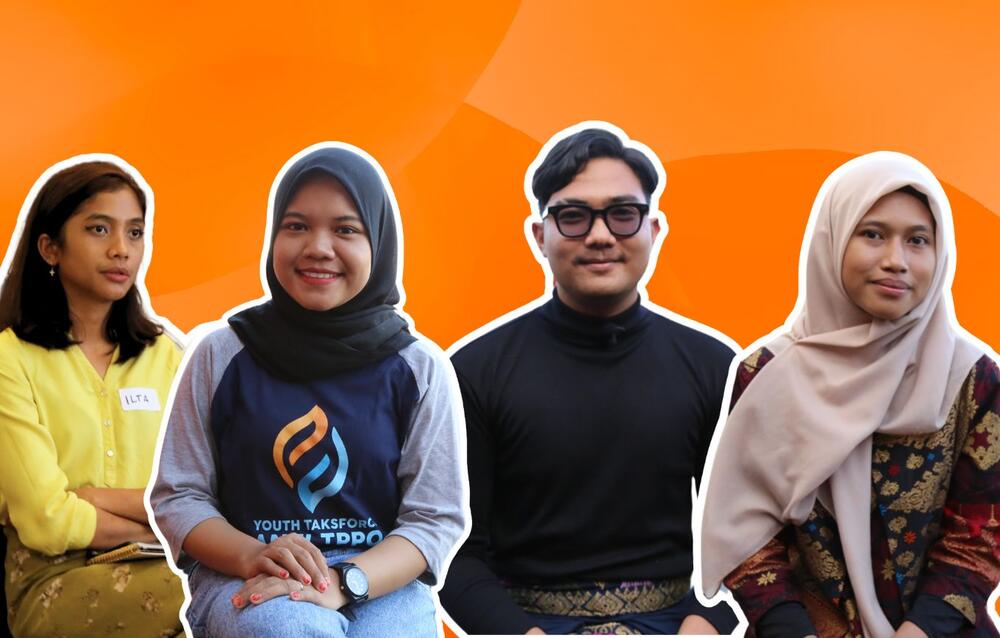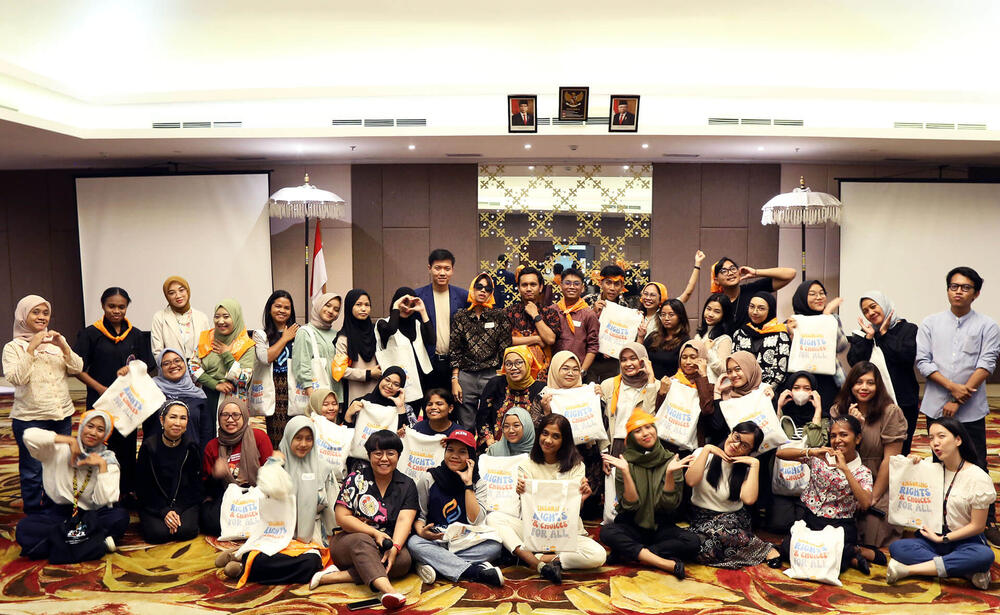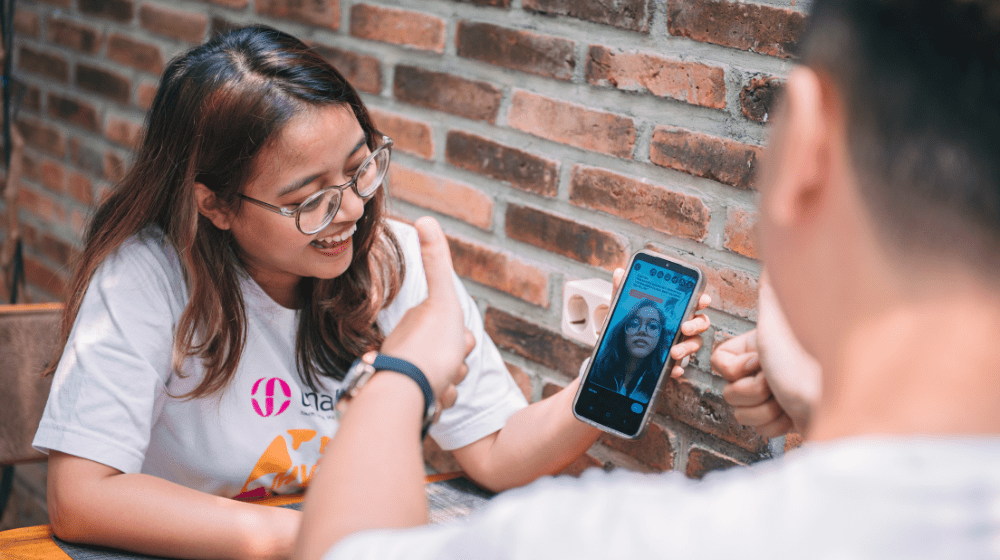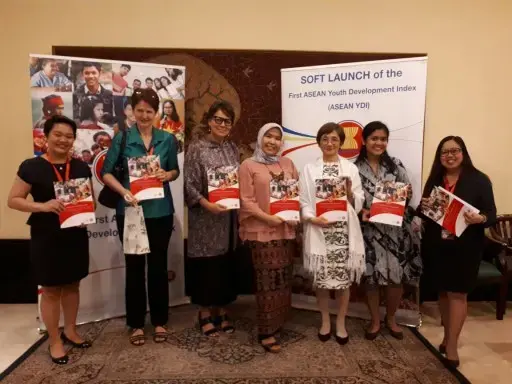In the heart of Indonesia, a quiet change is brewing. Young people, armed with smartphones and unwavering determination, are taking a stand against the deeply rooted issues of child marriage and female genital mutilation/cutting (FGM/C). Their tool of choice? Digital platforms.
Breaking the Silence and Overcoming Adversity
Indonesia carries the heavy burden of a silent crisis where the echoes of stolen childhoods reverberate. The 2023 Indonesia Socio-economic National Survey/Susenas 2023 paints a stark picture: one in 14 girls (6.92%) is married before reaching adulthood, curtailing her dreams and aspirations. Latest data from the BPS-Statistics Indonesia on Age Specific Fertility Rate further reveals the alarming reality that 27 out of 1,000 girls aged 15-19 were pregnant (Long Form Population Census 2020). The specter of Female Genital Mutilation/Cutting looms large, with the 2021 National Women’s Life Experience Survey (SPHPN 2021) indicating a staggering 55% of women aged 14 to 59 reported their daughters had undergone this harmful practice. These practices, steeped in tradition, leave scars that run deep— inflicting physical and psychological wounds to women who experienced it. The child marriage and FGM eliminate young female’s rights over their body and hinder them from having a healthy and a full potential of future.
As Hassan Mohtashami, UNFPA Indonesia Representative, aptly points out, "Without sexual and reproductive health and reproductive rights, we will not achieve full gender equality and human rights, hindering our progress in development, peace, and security."
"Without sexual and reproductive health and reproductive rights, we will not achieve full gender equality and human rights, hindering our progress in development, peace, and security."
With 150 million Indonesians online, the potential for social change is immense. A new generation of activists is harnessing this power, transforming digital platforms into tools for empowerment. Roudhotul Jannah, a member of the Youth Taskforce Against Human Trafficking in Central Java, exemplifies this spirit. "I thought to myself, if I don't speak up, who will?" she says. "Especially about issues like these, where young people are not as vocal."

The Power of Personal Stories
Jannah’s journey began with personal experiences of gender inequality, but it was the realization of the broader impact of child marriage and FGM/C that ignited her passion. Through her advocacy, she has created a safe space for others on her campus and social media platform to share their stories, inspiring a ripple effect of awareness and action.
In remote villages of South Central Timor Regency of East Nusa Tenggara Province, where access to information is limited and traditional practices hold sway, young activists like Ilta Tafuli are working tirelessly to break the silence. A 21-year-old coordinator of the Tenggara Youth community, Tafuli is committed to creating safe spaces for education and dialogue. "Growing up in South Central Timor Regency, I was acutely aware of the lack of access to information and the taboos around sexual and reproductive health," she shares. "This led to violence against women, harassment, and other crimes. It was a wake-up call for me."
Tafuli has just completed her first degree and aims to become a primary school teacher. She is committed to integrating adolescent reproductive health education into her teaching materials, as she aims to prevent adolescent girls in her area from becoming a victim of violence and harassment.
Muthiah Naurah Arafah, a recipient of the BESTARI scholarship—a collaborative effort between UNFPA, the Ministry of Women's Empowerment and Child Protection, and the Khouw Kalbe Foundation to safeguard Indonesian girls at risk of child marriage or violence against women and girls—has witnessed firsthand the devastating impact of child marriage in Bantaeng, South Sulawesi Province where she has been living thus far. "In high school, several classmates dropped out due to marriage," she shares.
For many young activists, the fight against child marriage and FGM/C is deeply personal. Reza Anugrah, a survivor of gender-based violence raised in a broken home, understands the devastating impact of these issues firsthand. "I've seen how gender inequality and violence affect children's well-being. I don’t want this to happen to others," he says.
"I've seen how gender inequality and violence affect children's well-being. I don’t want this to happen to others,"
Working in Central Sulawesi Province, Reza faces the challenge of deeply ingrained cultural norms and limited access to information. "Most of the areas I work in are rural, so access to information about reproductive health services, laws, and policies is very difficult," he explains. "This lack of awareness makes child marriage and FGM/C seem normal, and many cases occur due to cultural pressure or social norms."

A National Call to Action
The "Youth Dialogue on Youth Actions Against Child Marriage and Harmful Practices," held in Bali in November 2023, underscored the power of youth-led movements in addressing these critical issues. Through insightful discussions, data-driven insights, and personal narratives, young activists gained a deeper understanding of the challenges and opportunities in their fight. Workshops on content creation and media literacy, aligning with the spirit of International Youth Day 2024's theme, "#YouthLead: Youth Leadership for Safe and Inclusive Digital Spaces," further equipped them to harness the potential of digital platforms for advocacy and change.
Recognizing the transformative power of youth engagement in the digital age, UNFPA Indonesia established the Community of Practice (CoP) for young digital content creators on sexual and reproductive health issues in 2020. This platform fosters knowledge exchange, capacity building, and collaboration, empowering young people to amplify their voices and become catalysts for change. As Muthiah eloquently stated, "I hope young people become pioneers and reporters in their communities, speaking out against harmful practices and advocating for change."
While technology presents vast opportunities for progress, it is essential to acknowledge the existing digital divides. As Reza points out, "In the areas where I work in Sigi and Donggala regencies, many children live in regions without access to digital resources like the internet or suitable devices. Even basic road access and mobility are significant challenges, making digital campaigns impractical for these areas."
Ilta echoes these concerns, emphasizing the limitations of digital outreach in certain regions. "Given the low digital usage in some areas with minimal child marriage rates and vulnerable groups in our locations, we also combined face-to-face campaigns and we called it ‘'Bacarita Kespro' approach. This method involves casual discussions that create a safe and comfortable environment for sharing information and finding solutions."
These insights highlight the importance of context-specific approaches that consider the diverse realities young people face across Indonesia. While digital platforms offer invaluable tools for advocacy, on-the-ground engagement, and community-led initiatives remain vital. Bridging the digital divide and ensuring equitable access to technology are crucial steps in empowering all young people to lead the charge against harmful practices and create a more just and equitable future for all.
A Brighter Future
The path to eradicating child marriage and FGM/C is long and arduous, but the determination of these young activists is a beacon of hope. Their stories are a reminder that change is possible, even in the face of deeply entrenched traditions and practices. As Roudhotul Jannah aptly puts it, "We need to maximize our potential for good, especially in fighting child marriage and FGM/C. It starts with those close to us—our families, friends, and communities. A small effort can have a big impact."
These digital activists are not just advocates; they are the embodiment of change. Their stories are a testament to the power of the human spirit and the potential of technology to drive positive transformation. In the face of adversity, they are rising, their voices echoing across the digital landscape, demanding a world where every child has the opportunity to reach their full potential, free from the threat of child marriage and FGM/C.
—-
Itsnain G. Bagus
Communications Associate, UNFPA Indonesia




